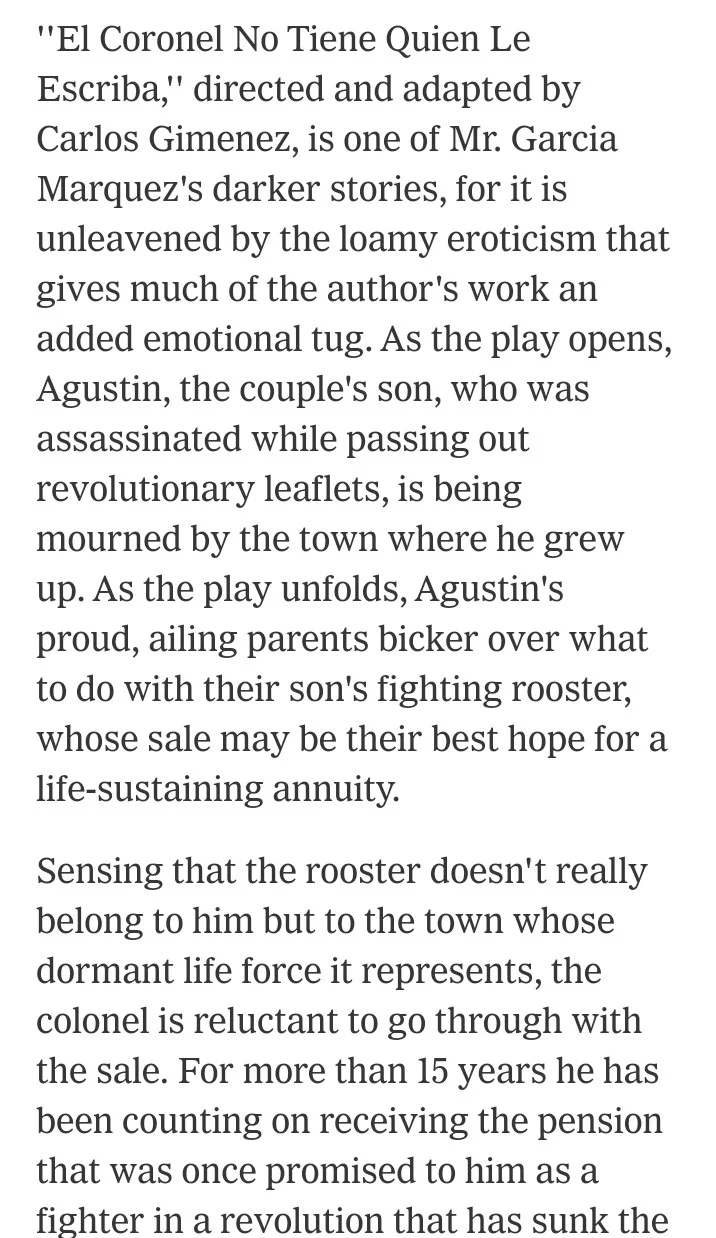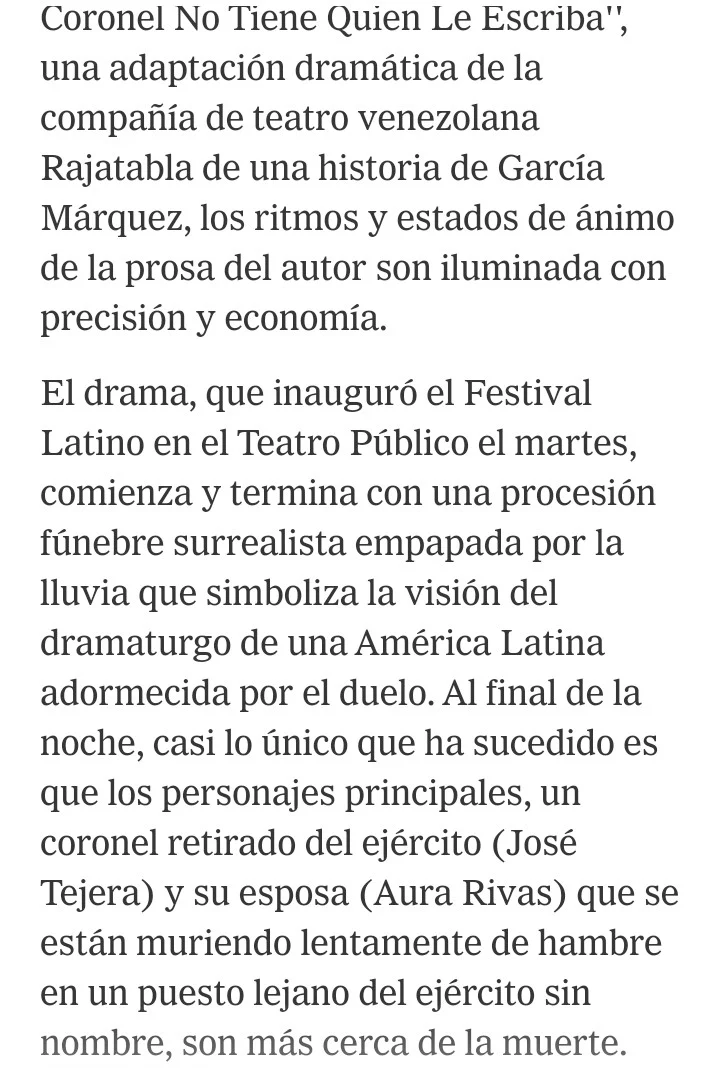“Es el rito del horror.
¿Por qué tanto odio?pregunta.
Sus enemigos lo perseguirán después de muerto.
Ya vendrán los libelos y los epitafios.
Nosotros recogemos al padre jesuita Bouhours:
'Moliere, nada a tu gloria faltaría,
si entre los defectos que tan bien descubriste,
hubieras incluido
tan negra ingratitud'.”
Moliere, Caracas, 1984
Agradecemos todo el apoyo del Comité Asesor integrado por: Rolando Peña, José Pulido, Rubén Monasterios, Nabor Zambrano, Giorgio Ursini Ursic, Ángel Acosta, Ángela Zago, Carmen Carmona, Marta Candia, Teresa Selma, Rodolfo Molina Candiales, José Augusto Paradisi Rangel, María Cristina Lozada, Francisco José, Myriam Pareja, Armando Africano, y todas las personas participantes del homenaje.
1) Vídeo homenaje a Carlos
2) Video de García Márquez elogiando el montaje de El Coronel con escenas de El Coronel actuadas por José Tejera y Ángel Fernández Mateu.
3) Video (a realizado) con frases impactantes de las críticas de diarios mundiales como The New York Times , Le Monde , etc.
4) Roberto Magurno y Amelia Almada: anécdotas sobre la infancia de Carlos y su primer grupo teatral El Club de los Corazones Unidos.
5) Vídeo Carlos Giménez la paz y la libertad
6) Jorge Arán : anécdotas. El Juglar, giras Europas, años 60.
7) Video (a realizar) sobre El Juglar .
8) Juan Pagés : anécdotas. Gira latinoamericana, llegada a Venezuela, Tu país está feliz.
9) Vídeo Señor Presidente .
10) Diego Balaguer : anécdotas. Caracas. Giras.
11) Francis Rueda : anécdotas. Tu País está feliz, El Campo.
12) Foto-vídeo El Campo de Griselda Gambaro.
13) Cecilia Bellorín : anécdotas. Bolívar. Giras internacionales.
14) Foto-Video The Tempest (montaje en Nueva York producido por Joseph Papp)
15) Mariana y Gabriela Llanos y Ana Lía Cassina: anécdotas. Carlos como tío.
dieciséis) Vídeo (a enviar) de Ángel Acosta .
17) Rafael Reyeros y Cristina Morini: anécdotas. El Coronel no tiene quien le escribe.
18) Vídeo (a enviar) de José Pulido.
19) Carlos Pérez Ariza : anécdotas. Carlos visto por la crítica.
20) Video Memoria del FITC (máximo 5 minutos)
21) Betty Angelotti : anécdotas. El Reñidero en Nueva York.
22) Vídeo Carlos Giménez por María Teresa Castillo.
23) Alvin Astorga : anécdotas. El Reñidero en Nueva York.
24) Juan Carlos Núñez : anécdotas. Cómo fue componer la música para Bolívar, Peer Gynt y La Tempestad.
25) Video (a enviar) de Nabor Zambrano y Angela Zago .
26) Ángel Ancona : anécdotas. Mozart, Despertar de Primavera.
27) Foto-Video Despertar de Primavera .
28) Margarita Irún : anécdotas. La Muerte de García Lorca en inglés y en Nueva York.
29) Vídeo (a enviar) de Rubén Monasterios.
30) Ángel Fernández Mateu : anécdotas. El Coronel no tiene quien le escribe. ElCampo. El Juglaro.
31) Texto El Caballo de Troya , de Carlos Giménez, leído por todas las personas participantes del homenaje.
32) Coro cantando, a capela, Te quiero , la canción favorita de Carlos. Se le dará la letra al público para que cante junto con el coro.
En el hall del teatro, si se acaba la pandemia del COVID, se proyectarán los siguientes videos durante todo el día y de ser posible, desde el 28 de marzo, día de la muerte de Carlos, hasta el 13 de abril.
1) Carlos Giménez entrevistado por José Antonio Rial .
2) Carlos Giménez:La Máscara frente al Espejo (video en 3 partes)
2.1 Parte 1
2.2. Parte 2
2.3. Parte 3
3) Memoria del FITC .
5) zapatos viejos . Televisión unitaria.
6) Jorge Luis Morales en La Máscara Frente al Espejo .
7) Alma Ingianni en La Máscara Frente al Espejo .
Ese era todo el homenaje.
Perdón, Carlitos.
18 de enero de 2023
V



















